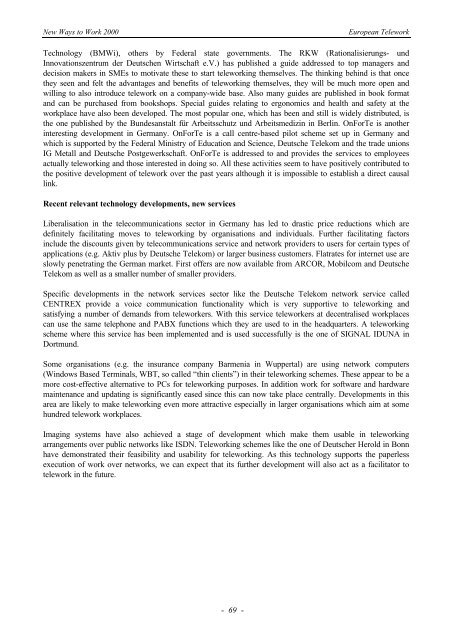eWORK 2000 - European Telework Week
eWORK 2000 - European Telework Week
eWORK 2000 - European Telework Week
- No tags were found...
Create successful ePaper yourself
Turn your PDF publications into a flip-book with our unique Google optimized e-Paper software.
New Ways to Work <strong>2000</strong><strong>European</strong> <strong>Telework</strong>Technology (BMWi), others by Federal state governments. The RKW (Rationalisierungs- undInnovationszentrum der Deutschen Wirtschaft e.V.) has published a guide addressed to top managers anddecision makers in SMEs to motivate these to start teleworking themselves. The thinking behind is that oncethey seen and felt the advantages and benefits of teleworking themselves, they will be much more open andwilling to also introduce telework on a company-wide base. Also many guides are published in book formatand can be purchased from bookshops. Special guides relating to ergonomics and health and safety at theworkplace have also been developed. The most popular one, which has been and still is widely distributed, isthe one published by the Bundesanstalt für Arbeitsschutz und Arbeitsmedizin in Berlin. OnForTe is anotherinteresting development in Germany. OnForTe is a call centre-based pilot scheme set up in Germany andwhich is supported by the Federal Ministry of Education and Science, Deutsche Telekom and the trade unionsIG Metall and Deutsche Postgewerkschaft. OnForTe is addressed to and provides the services to employeesactually teleworking and those interested in doing so. All these activities seem to have positively contributed tothe positive development of telework over the past years although it is impossible to establish a direct causallink.Recent relevant technology developments, new servicesLiberalisation in the telecommunications sector in Germany has led to drastic price reductions which aredefinitely facilitating moves to teleworking by organisations and individuals. Further facilitating factorsinclude the discounts given by telecommunications service and network providers to users for certain types ofapplications (e.g. Aktiv plus by Deutsche Telekom) or larger business customers. Flatrates for internet use areslowly penetrating the German market. First offers are now available from ARCOR, Mobilcom and DeutscheTelekom as well as a smaller number of smaller providers.Specific developments in the network services sector like the Deutsche Telekom network service calledCENTREX provide a voice communication functionality which is very supportive to teleworking andsatisfying a number of demands from teleworkers. With this service teleworkers at decentralised workplacescan use the same telephone and PABX functions which they are used to in the headquarters. A teleworkingscheme where this service has been implemented and is used successfully is the one of SIGNAL IDUNA inDortmund.Some organisations (e.g. the insurance company Barmenia in Wuppertal) are using network computers(Windows Based Terminals, WBT, so called “thin clients”) in their teleworking schemes. These appear to be amore cost-effective alternative to PCs for teleworking purposes. In addition work for software and hardwaremaintenance and updating is significantly eased since this can now take place centrally. Developments in thisarea are likely to make teleworking even more attractive especially in larger organisations which aim at somehundred telework workplaces.Imaging systems have also achieved a stage of development which make them usable in teleworkingarrangements over public networks like ISDN. <strong>Telework</strong>ing schemes like the one of Deutscher Herold in Bonnhave demonstrated their feasibility and usability for teleworking. As this technology supports the paperlessexecution of work over networks, we can expect that its further development will also act as a facilitator totelework in the future.- 69 -








